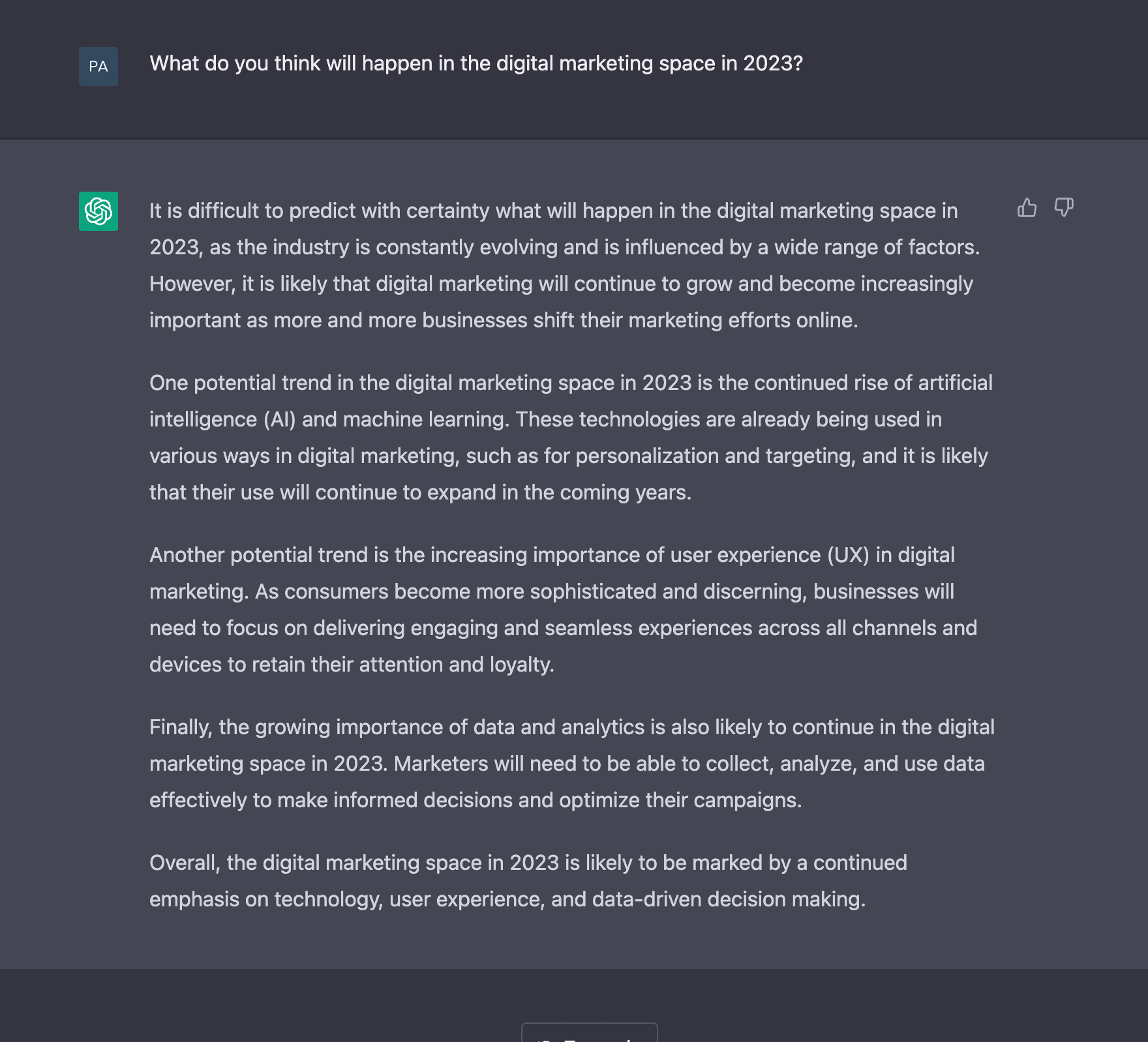With automation, and scalability being key pillars in most digital strategies, the notion of ChatGPT has gained significant traction since its launch in November 2022. Even celebrity A-Lister Ryan Reynolds has jumped on the AI bandwagon, using ChatGPT in an awareness campaign for his networking brand, Mint Mobile.
But what does ChatGPT actually do, what is Generative AI and what does this mean for those in the digital marketing space?
What Does ChatGPT Do?
ChatGPT is the most recent use of GPT (Generative Pre-Trained Transformer), an autoregressive, state-of-the-art language processor created by tech platform OpenAI. With over 175 billion parameters, GPT is one of the largest language processing AI models to date – and was first launched over two years ago as part of a trend in natural language processing (NLP) systems of pre-trained language representations.
Simply put, it is a hyper intelligent chatbot that simulates human-like conversations.
With the third generation of GPT being introduced in 2020, and the chatbot element introduced at the end of last year, OpenAI is valued at an estimated $20 Billion, with major investments from tech giants such as Microsoft aiding its growth.
The release of the ChatGPT prototype in November thrust OpenAI into the (mainstream) limelight, and users worldwide, across multiple industries, flocked to the site to test out the infamous chatbot. Questioning its capabilities in comparison to that of a human.
I must admit, as a content writer myself I was straight on ChatGPT, testing out its prospects – and the first thing I asked was what it thought would happen in the digital marketing space in 2023.
While the response is a little repetitive, it shows just how far we’ve come in the field of artificial intelligence and the revolutionary way we can interact with technology. In less than 30 seconds a machine has understood the query, scoured the internet, and answered the question in a succinct, conversational and understandable manner.
So when asked what ChatGPT is and/or does, it is (in a simple description) a language based chatbot that can understand, process and respond to human input via an instant messaging interface. Think of it as WhatsApping an always-on robot that can not only answer your questions and maintain a stream of communication, but it can also write your research paper, blogs or ad copy.
Generative AI
The latest ‘buzz word’ in the AI space, ChatGPT is what’s known as Generative AI. This refers to the process of using intelligence to generate new data, as opposed to analyzing and categorizing existing data – which is a more traditional AI practice.
Fast becoming the catch-all term for any artificial intelligence that creates something new, Generative AI is the latest hot topic in the AI space with ChatGPT firmly placing it front and center for the majority of tech investors and venture capitalists wanting to ‘get a piece of the pie’.
ChatGPT in the Digital Marketing Space
So, what does ChatGPT mean for those in the digital marketing space? First and foremost, ChatGPT is still in its infancy stage meaning that, while it is leaps ahead of its predecessors, it is a prototype, and there are still areas in which misuse or misconduct can occur. Although it’s been designed to avoid sensitive topics, it doesn’t always do this and can, in some cases, be tricked into ‘automating the creation of convincing and misleading text for use in influence operations’.
Additionally, it can ‘get things wrong’ and in most cases, shouldn’t be left unsupervised – seemingly contradictory considering ChatGPTs whole USP is its ability to process huge quantities of data without human oversight.
It’s also worth noting that, while the system consults an astronomically large database of reference material, it is limited within that reach. This means, if a question is asked that isn’t within the database, ChatGPT cannot amalgamate a response. The benefit of this is that, on a paid model, ChatGPT can be trained on proprietary data, which means it can be tailored to a specific industry or business.
From a channel/solution specific perspective, both SEO and Personalization stand to be impacted, or effected by the launch of ChatGPT.
ChatGPT and SEO
When looking at SEO, one of the biggest discussion points is around the content creation abilities of ChatGPT. Initially it’s important to note that ChatGPT, and other intelligent chatbots in general are a threat to Google’s search dominance, as they are, ultimately, an alternative form of human-computer communication. As a result Google has claimed, up to this point, that AI generated content goes against its Webmaster Guidelines and will not perform well in the SERPs. To add, 2022 saw a wealth of algorithm updates focused specifically on content, namely the Product Reviews Updates and the Helpful Content Update, and of course content is a central theme to Google’s Core Update.
But, this shouldn’t put content creators and SEOs off using ChatGPT or AI.
If we take a closer look at Google’s guidelines on creating helpful content, we see that ChatGPT outputs certainly meet some of the criteria, most notably on content that is helpful, reliable, provides value, and leaves readers with a satisfied experience. Additionally, it’s true that ChatGPT produces content that is arguably more reliable than much of the human-created, poor quality content that exists online. However, where ChatGPT falls short is creating completely original information, research or analysis. Also, for certain industries (particularly health and finance) and for certain types of content (in-depth product reviews) content authored by experts is essential for creating quality content that ranks well.
In short, ChatGPT can potentially be a helpful SEO and content tool for: Product descriptions, FAQs, Translations, Schema.
However don’t use it to: Create compelling sales copy, nail your brand voice, create in depth product reviews, replace topic experts, create content where the output isn’t unique.
To quote Incubeta’s SEO Team Lead, Bridget Hoepner, ‘never rely on ChatGPT entirely for your content creation – copywriting is one of the most powerful persuasion tools at our disposal’.
ChatGPT and Personalization
As it stands, the industry is very much focused on automation, and automated solutions as a means of increased scalability. While it’s not a new concept to integrate AI within these solutions, the birth of technologies like ChatGPT are seeing the process simplified significantly – making it easier to test ideas, create dynamic creatives, and deliver personalized messages.
Take copywriting as an example – a traditionally time-consuming task, especially if you’re working on multiple campaigns at once. By feeding in a few key details about your project, ChatGPT can generate multiple options for you to choose from – streamlining and fast tracking your process.
Providing more diverse perspectives is another way ChatGPT can help marketers. You can easily fall into a creative rut, coming up with the same ideas repeatedly. It is possible to generate more innovative and effective campaigns if you use ChatGPT to generate multiple options for you to choose from.
Additionally, marketers could also improve outcomes and reduce costs by using data mining, machine learning, and predictive modeling. Plug this into a visualization tool, and now you can effectively communicate your findings.
With minimal admin work, ChatGPT can provide personalized recommendations based on customer data and preferences, enhancing customer engagement and providing personalized experiences.
Summary
There’s no denying that ChatGPT is a tipping point for AI. While derivatives of it have been around for a while, OpenAIs answer to the chatbot has revolutionized the way the industry views Artificial Intelligence. And this is just the start. Already we’ve seen OpenAI in discussions to sell shares in a tender offer that would value the company at $29 billion, plus Microsoft is preparing to add ChatGPT to its Bing search engine in a bid to lure users away from Google. Not to mention that Google is already having discussions about launching a rival search chatbot – ‘focusing on AI as a domain of primary importance’.
Each day the boundaries of possibility are being tested, and ChatGPT is the latest proof. But that’s not to say it’s all positive. Dark Forest theorists do argue that the majority of open and publicly available web spaces are overrun with bots, advertisers, keyword-stuffing “content creators, and algorithmically manipulated junk – to name a few. And ChatGPT will only add to this.
With the ease in which ChatGPT produces content, humans will need to develop mental filters to spot AI written content or to communicate in ways that are obviously not GPT generated. Developing a fresh style that an AI bot can’t replicate.
As the Global Content Manager for Incubeta, I too queried the functionality of ChatGPT – and its ability to produce quality written outputs. As its capabilities rise, who’s to say my role won’t become redundant?
So I asked my rival what it thought…
‘ChatGPT is a powerful language generation model that can assist with a wide range of writing tasks, including content writing. However, it is important to note that ChatGPT is a tool that can be used to help with writing, but it is not a replacement for human writers. It can help to generate ideas, provide inspiration, and even draft entire pieces of content, but human writers are still needed to review, edit and finalize the content. Additionally, ChatGPT cannot create unique and original ideas like human writers can’
It would seem as if I’m safe in my role… for now anyway.
For more information on what Generative AI could mean for your business, and how Incubeta can help you, get in touch today.




